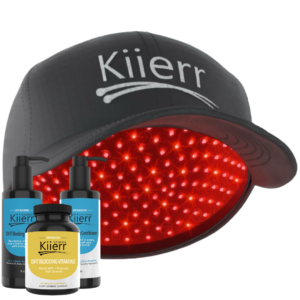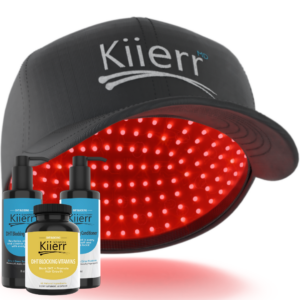Table of Contents
- 1 Selenium Sulfide For Hair Loss: Overview
- 2 What is Selenium?
- 3 Where is Selenium found?
- 4 Selenium in Food
- 5 Why do I need Selenium in my diet? Can lack of Selenium Cause Hair Loss?
- 6 Benefits of Selenium for Hair Loss
- 7 Zinc and Selenium for hair Loss
- 8 6 Additional Health Benefits of Selenium
- 9 Beware of Too Much Selenium
Selenium Sulfide For Hair Loss: Overview
Have you ever heard of selenium? Well, this awesome nutrient is vital to your wellbeing.
Selenium is a vital mineral for your health; it must be consumed through your diet and can help with some types of hair loss.
Many of its health benefits are brought about by proteins containing selenium, called selenoproteins (Labunskyy, 2014). But, like with many nutrients we need, getting too much can be just as dangerous as too little.
This article outlines why selenium is important to prevent hair loss, in addition to other health benefits of having it in your diet.
What is Selenium?

Selenium is a basic trace mineral that is pivotal to several processes within several systems of the body. It functions in the immune system, reproductive system, the nervous system and other parts of the body.
Selenium is one of the 24 selenoproteins that contribute strongly to reproduction, the synthesis of DNA, metabolism of thyroid hormones, and immunity from infection and oxidative damage. Selenium may either be organic or inorganic meaning, found in the ground, food or as a supplement.
Where is Selenium found?
In its organic form, Selenium is mostly found in the soil. They then accumulate in plants as selenocysteine and selenomethionine and a host of other methylated derivatives.
More often than not, Selenium is found in the form of selenomethionine which is found in human and animal tissues. It is in these tissues that it joins with amino acid methionine in proteins of the body. The skeletal muscles however, account for the highest storage of Selenium. They could house up to 46% of the total Selenium in the body. Selenium may also be concentrated in the blood plasma and serum, urine, hair, or nails.
Selenium in Food

If you’re looking for meals that provide you with enough Selenium, then you should be eating lots of different types of food high in selenium such as:
- Brazil nuts, seafoods, and organ meats. Grains, cereal, dairy products, and muscle meats also provide Selenium.
- Basic diet, eggs, bread, grain, meat, fish, poultry. Interestingly, water can also supply the body with Selenium.
Diets that are not so rich in Selenium can be supported by multimineral and multivitamin supplements, which stand on their own.
Why do I need Selenium in my diet? Can lack of Selenium Cause Hair Loss?
The answer is simple. You need Selenium in your diet because you want to prevent the issues that occur when you don’t have enough Selenium in your diet, such as hair loss and other issues. According to Abraham Armani, MD, a hair restoration surgeon and hair loss expert in Dallas, Texas in this WebMD article “When lack of selenium occurs, it may disrupt thyroid functioning, which can cause hypothyroidism and hair loss.” Preventing these issues is the real importance of Selenium. Lack of Selenium may also lead to infertility in males and stunted physical and mental growth in children due to thyroid and iodine deficiencies.
The lack of Selenium in the body also gives free radicals a field day in the body. Free radicals make people age easily and prematurely. It also causes weak hair follicles leading to serious hair loss.
Yes, you can prevent all of these just by taking Selenium.
Benefits of Selenium for Hair Loss
- Selenium is essential for the production of thyroid hormones that help to regulate hair growth, states, health author, Mary Shomon
- Selenium kills the dandruff fungus which is an ingredient in many dandruff treatments, making your hair more healthy.
- Adequate amounts of selenium in the diet are essential for regular hair growth. Make sure you are consuming at least 55mcg per day and up to 400mcg per day, according to PubMed.gov. See table 1 below for recommended dietary allowances.

Impact of Selenium on Hair Loss
The impact of Selenium on the hair is not exactly direct. The Selenium impacts some organs, hormones, or enzymes in the body, which in turn affect the growth of the hair.
Enzymes are molecular elements that provoke different chemical reactions in the body. Some of these enzymes help the body to get rid of free radicals. With the presence of Selenium in the body, these enzymes leave the stage for Selenium to clean out the free radicals.
Apart from the enzymes that clean out free radicals, Selenium also improves the performance of enzymes that produce antioxidants like vitamin C in the body. The effect of these antioxidants is that they give the body a better hair loss and growth cycle. Thus, if the enzymes producing antioxidants are optimized by Selenium, then the hair loss and growth cycle is also optimized, thanks to Selenium. Selenium also helps to destroy any fungus that causes dandruff in the hair.
It is, however, important to note that excessive intake of Selenium also has its side effects in the body and may also contribute to hair loss.
Zinc and Selenium for hair Loss
According to this GQ article on supplements for hair loss “the minerals zinc and selenium can be especially beneficial. Zinc improves oil production (in a good way, to produce the necessary amounts of sebum), and is one of the best means of slowing hair loss. Selenium prevents and combats dandruff and dry, itchy scalps, which can hinder hair’s path to prominence. Find supplements that combine any and all of these vitamins and minerals for more proactive defense against hair loss.”
6 Additional Health Benefits of Selenium
- Selenium helps your immune system to protect you from diseases. When your body lacks Selenium, you tend to be exposed to certain diseases, especially when you’re extraordinarily stressed. One of these diseases is Keshan disease, which ravaged China until the government-sponsored selenium supplements for people in the area. Presently, adequate intake of Selenium protects people from Keshan disease.
- A healthy intake of Selenium prevents early deaths of an infant in pregnant women with HIV, as well as hospitalization among HIV patients.
- Selenium also reduces the risk of colorectal, prostate, lung, bladder, skin, esophageal, and gastric cancers, as well as mortality rates from these cancers.
- Selenium protects the body from heart disease, thyroid diseases and different types of cancers.
- It maintains cognitive abilities and prevents deterioration in cognitive functions.
- It reduces asthmatic crisis and symptoms in the body.
- Selenium as a supplement is helpful in treating chemotherapy. According to this clinical trial “patients with ovarian cancer undergoing chemotherapy showed a significant decrease in hair loss and other gastrointestinal symptoms in patients receiving selenium supplementation, as compared with controls. The authors concluded that ingesting selenium is a supportive element in chemotherapy.”
Beware of Too Much Selenium
According to this medical study about the role of vitamins and minerals in hair loss – “Selenium ingestion in an amount exceeding 400 μg daily may cause toxicity. Symptoms of acute or chronic selenium toxicity include nausea, vomiting, nail brittleness and discolorations, hair loss, fatigability, irritability, and foul breath odor.”
Summary – Can Lack Of Selenium Cause Hair Loss? Yes.
Selenium is a powerful trace mineral that is not only essential to health but beneficial to the body’s vitality and beauty. If Selenium concentrated foods are consumed in the right proportions, it strengthens the body’s general performance and is beneficial to hair loss conditions.
References:
- Selenium: Fact sheet for health professionals https://ods.od.nih.gov/factsheets/Selenium-HealthProfessional
- https://www.healthline.com/nutrition/selenium-benefits#1.-Acts-as-a-powerful-antioxidant
- https://www.projeto.vanguarda.inf.br/seagram-s-mjsuq/21f54d-selenium-benefits-for-hair
- https://www.ncbi.nlm.nih.gov/pmc/articles/PMC4726178/
- https://pubmed.ncbi.nlm.nih.gov/17023702/
- https://www.ncbi.nlm.nih.gov/books/NBK482260/
- https://pubmed.ncbi.nlm.nih.gov/26302929/
- https://pubmed.ncbi.nlm.nih.gov/24987004/
- https://ods.od.nih.gov/factsheets/Selenium-HealthProfessional/
- https://www.ncbi.nlm.nih.gov/pmc/articles/PMC6380979/
- https://www.gq.com/story/supplements-for-hair-loss#:~:text=Secondly%2C%20the%20minerals%20zinc%20and,hinder%20hair’s%20path%20to%20prominence.
- https://pubmed.ncbi.nlm.nih.gov/15661254/






